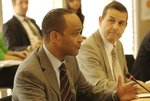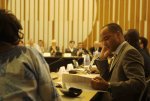Pierre-Richard PROSPER
contribution 07 -
PROSPER Pierre-Richard

tags
RPF prosecutionoriginal version
Thank you, Mr. Chairman.
First, before we begin, I would like to thank the organisers of the Conference. I think this is an impressive and incredible collection of experts and persons who have been committed to these issues for 15 years or more and have actually made a difference to humanity. So, again, I want to applaud the organisers for this and thank you for inviting me.
What this has done and what this will allow us to do for the next few days is to have retrospective to learn the lessons from that work, both positive and negative. And I think one of the things that we need to keep in mind as we go through this, particularly in the early days, is thtat we were involved in a process where we were dealing with prosecution strategy where we were figuring out as we went along. It was something that had not been done before. There was a groundwork or a framework as Mr. Othman has stated that helped us and guided us as we were moving forward, but a lot of our prosecution strategy developed and evolved based on the nature of the investigations and what we learned.
For example, in the Akayesu case, when Akayesu was indicted, we knew that there was sexual violence and rape taking place. But we never had direct evidence that we could take back to Akayesu, the Accused, or a theory that we could take place, because all the accounts that we got from NGOs and others were of incidents of rape by militiamen, perpetrators, but nothing that brought us to a higher level.
It wasn’t until further investigation that we discovered a witness who explained to us a series of events at the bureau communal in Taba that just opened a whole door for us and made us realise that part of the reason we were having difficulty in getting information was that when the women were raped and violated at the bureau communal, most of them were killed afterward. So we never really got the story to show how it was structured and organised. So once we got that story we were able to develop it, find and encourage other witnesses to come forward and have the courage to testify, we issued the indictment. It moved forward, and the rest, as we know, is history. So I think a lot of it evolved with time.
The second point I want to talk about, which I didn’t plan on talking about until the generous salute from Philip Reyntjens, is this issue of governmental interference, for lack of a better phrase. I will talk about the incident that you raised. I will not talk about the point that you raised of Madam Del Ponte paying the high price because, firstly, I disagree with that. Secondly, we will just not talk about that issue unless the door is opened. And if the door is opened on that subject, then we can have a conversation, but we will leave it at that. Madam Del Ponte and I are friends and continue to be friends.
It’s interesting that you say that I, or the United States government, buried the investigation, because I’m not sure where you are getting that information. You clearly did not speak with me. You clearly did not go to the State Department to get the records of conversations, the cables that went out. You clearly found information that supported your preconceived idea of what may or may not have taken place.
What actually took place and Madam Del Ponte, I am not sure if her recollection is the same we, in whatever year that was, 2003, convened a meeting in Washington to see if we could broker some sort of an agreement, understanding between the Tribunal and Rwanda, to see if we could get pass this impasse because the goal that we were seeking was to have broad justice and clear justice take place.
The solution that I put forth was similar to what everyone in this room has come to accept and understand with the International Criminal Court is that a principle of complementarity. And what we proposed at that time was that, okay, let’s give the Rwandans an opportunity to prosecute these individuals with the assistance of the ICTR and that the ICTR would still maintain the authority, the jurisdiction to come in if necessary. But it was a way at least to advance the issue and get past the stalemate. A document, a minute of the proceedings was drafted and you’re an academic. I’m surprised you haven’t done your research and found it which was communicated to the parties for their review and acceptance. And ultimately it was not accepted. I know that, and I’ll let Madame Del Ponte speak for herself, but there were issues with New York and the legal department as to whether or not she could enter into something like this. And at the end of the day, a decision was made not to proceed with this brokered agreement and the issue laid dormant.
So your speculation I think is just that, Mr. Reyntjens. And I would recommend that prior to using terms like buried, or whatever else you use, that you do a little bit more fact finding so that you get a better appreciation of what actually took place. But again, I’m glad that we’re comfortable enough with each other to be able to have this frank and direct conversation, because this is an important seminar where we want to get to the root of our work for the past 15 years and get a firm understanding of our successes, our challenges, as well as our failures.
J.P. GETTI
Cécile Aptel ?


